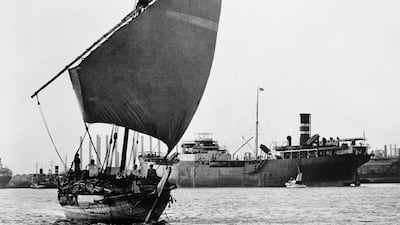The century’s anniversary of the end of the First World War, commemorated last Sunday, also marks the decisive entry of oil into global technology and politics. It shaped the modern Middle East, bringing consequences we live with today. And it has lessons for today’s changes in the global order.
The war pitted Prussian coal, steel and railway timetables against Allied oil. New vehicles and weapons waged war on land, in the air and on the seas. Fleets of Parisian taxis, meters running, ferried soldiers to the front to win the crucial battle of the Marne. By 1918, British tanks lumbered forward at five miles per hour to break the German lines. Primitive biplanes had evolved into bombers that could reach Berlin.
Construction of a powerful German fleet was one of the pre-war signs that Europe’s rising power intended to challenge the century-long British hegemony. Winston Churchill’s decision in 1912 to convert the Royal Navy from coal to oil gave it the advantage in range and speed, but necessitated access to a secure source. The British government purchased a majority share in Anglo-Persian, later BP, which later embroiled them in the nationalisation of 1951-3 and the coup against the elected government of Mohammad Mossadegh in Tehran.
Oil from America, Venezuela, Mexico and Persia fuelled the Allied war effort. Withdrawing from Romania in 1916, they sabotaged the famous petroleum installations of Ploieşti to deny them to the Central Powers. At the war’s end, as Russia dissolved into revolution, the Turks attempted to seize the oil fields of Azerbaijan, where the young Stalin had cut his teeth as a Communist agitator.
Before the war, German and Turkish interests had sought to develop oil in Mesopotamia, raising British concerns for the safety of the route to India. The “Berlin to Baghdad railway”, a grandiose geopolitical project, in reality resolved into ramshackle lines. But it was one part of the broader pre-war geopolitical competition, whose mutual suspicions formed the tinder that burst into conflagration in 1914.
As part of the peace settlement, the British were determined to secure the former Ottoman province of Mosul, including a large Kurdish population. With deceptive casualness, British prime minister David Lloyd George announced French premier Georges Clemenceau’s inquiry of what he wanted. “Mosul. You shall have it,” Clemenceau replied. Mosul was incorporated into the British mandate state of Iraq, and the French received in turn a stake in the Iraq Petroleum Company.
Gertrude Bell, intrepid traveller and architect of the new country, wrote: “They are making such a horrible muddle of the Near East. I confidently anticipate it will be much worse than it was before the way”. The massive oil find at Kirkuk in 1927 vindicated Lloyd George’s ambition but continues today as a central target of contention between Baghdad and the autonomous Kurdish region.
The mandates of Palestine, Transjordan and Iraq were intended to secure a swathe of secure territory guarding the way to the oil of Persia and to India beyond. Geopolitical theorist Halford Mackinder had argued in a seminal 1904 article that the rise of railways was altering geopolitics and undercutting traditional British control of the seas, with land routes and the control of the Eurasian heartland becoming paramount. This came against the backdrop of the ‘great game’ for influence in Central Asia, where Russia, not Germany, had been Britain’s pre-war opponent.
Mackinder’s theory was extended by the development of new long-range planes, requiring suitable refuelling stops. Air-bases were established at Suez, and Habbaniya in Iraq, and in 1932, the first flight landed in Sharjah, an alternative to the Basra-Karachi part of the Indian route.
Today the Middle East’s oil resources are even more important than a century ago for the world. Even though booming American output reduces its direct dependence, the booming Asian states are more reliant than ever. The US still remains the region’s dominant power, but globally, the geopolitical balance has shifted partly back towards the multipolarity of 1914.
The western alliance is showing cracks over issues including Russian interference and sanctions on Iran. Moscow has struck oil deals with the Kurdish region and for inward investment with Mubadala Petroleum, and worked closely with Opec and particularly Saudi Arabia, all while remaining a partner of Iran.
Most strikingly, China’s massive ‘Belt and Road’ initiative aims to span Eurasia and the Indian Ocean with a web of electricity lines, oil and gas pipelines, railways, roads, ports and power plants. Investments in oil fields in Iran, Iraq and Abu Dhabi, and ports astride vital oil and gas trade routes in Djibouti, Pakistan, Sri Lanka and Myanmar, lead to a spreading regional footprint. Officially an economic development project, some observers see the BRI as an attempt at continental domination, or at least securing Chinese energy imports.
And, as in the immediate pre-war period, novel energy systems promise to reshape geopolitics. Electric vehicles and renewable energy may undercut the primacy of oil, gas and coal. New resources, such as cobalt, lithium and rare earth elements, rise in salience. Beijing’s aim seems to be to overcome its vulnerability in traditional energy with its excellence in manufacturing new technologies.
The global context has of course changed immeasurably since the First World War. Although the Middle East is beset by numerous conflicts, and tensions between the US, European Union, Russia and China have risen, there is hopefully nothing like the cataclysm of 1914 on the horizon. But new energy technologies and resources again promise to recast military and geopolitical balances, even while the region is still haunted by the long shadow of 1918.
Robin Mills is CEO of Qamar Energy, and author of The Myth of the Oil Crisis


